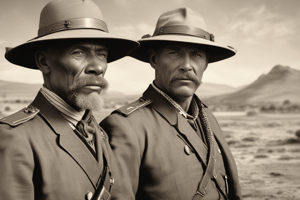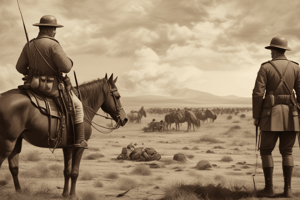Podcast
Questions and Answers
What was a key reason for Britain's long-term control over the Cape of Good Hope?
What was a key reason for Britain's long-term control over the Cape of Good Hope?
- Its fertile agricultural land
- The establishment of local governance by the Boers
- Its strategic military value as a naval base (correct)
- The discovery of diamonds in the area
What prompted the Great Trek led by the Boers in the late 1830s?
What prompted the Great Trek led by the Boers in the late 1830s?
- Support for British annexation of Natal
- Search for gold and diamond mines
- Opposition to British policies towards people of colour (correct)
- Desire for economic opportunities in the interior
Which event led to Britain annexing Natal in the early 1840s?
Which event led to Britain annexing Natal in the early 1840s?
- The Boers' declaration of independence in Natal (correct)
- The Boer objections to British laws on slavery
- The establishment of the Orange Free State
- The discovery of gold in the Transvaal
What was the main economic catalyst for Britain's increased interest in the Boer Republics in the late 19th century?
What was the main economic catalyst for Britain's increased interest in the Boer Republics in the late 19th century?
What did Britain recognize regarding the Boer Republics by the early 1850s?
What did Britain recognize regarding the Boer Republics by the early 1850s?
What role did Simon's Town play in British interests in South Africa?
What role did Simon's Town play in British interests in South Africa?
What was a significant outcome of the South African mining and industrial revolution?
What was a significant outcome of the South African mining and industrial revolution?
By which treaty was Britain's control of the Cape of Good Hope internationally accepted?
By which treaty was Britain's control of the Cape of Good Hope internationally accepted?
Flashcards are hidden until you start studying
Study Notes
British-Boer Rivalry
- British control of the Cape of Good Hope was established by 1815.
- The Cape was strategically important for Britain due to its position as a naval base and access point to eastern colonies and trading interests, especially India.
- Simon's Town, a British naval base in the Cape, was built by 1814.
- The Great Trek occurred in the late 1830s as thousands of Boers, accompanied by servants of colour, left the Cape to escape British rule.
- Boers objected to British policies favoring people of colour, such as granting them legal equality and freeing slaves.
- Britain annexed Natal, a fertile land with a valuable coastline including Port Natal (later Durban), in the early 1840s.
- The Boers established the South African Republic (Transvaal) and the Orange Free State as independent republics in the interior by the early 1850s, which Britain acknowledged as independent due to lack of vital interests.
The Struggle for Control of Mines
- The discovery of gold on the Witwatersrand in the Transvaal in 1886 significantly raised British interest in the Boer Republics.
- This discovery sparked the South African mining and industrial revolution, leading to an explosion in demand for capital, labor, transport, and infrastructure.
- The Transvaal emerged as the center of economic activity in southern Africa.
- This shift made southern Africa strategically and economically more significant for Britain.
Studying That Suits You
Use AI to generate personalized quizzes and flashcards to suit your learning preferences.




